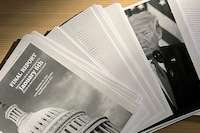The overhaul of the Electoral Count Act, which the House passed on Friday as part of its end-of-year omnibus spending bill, is a splendid Christmas gift for anyone who cherishes democracy. Hashed out by a bipartisan group led by Sens. Susan Collins (R-Maine) and Joe Manchin III (D-W.Va.), these reforms clarify legislation from 1887 that President Donald Trump tried to abuse on Jan. 6, 2021, so he could cling to power after losing reelection. No wonder, then, that fixing the Electoral Count Act is the first, and most important, of 11 recommendations in the 845-page report that the House select committee investigating Jan. 6 released on Thursday.
Jan. 6 committee recommendations would (mostly) help preserve democracy

The updated law makes clear that the vice president serves a ministerial role at the joint session in which electoral college votes are counted and does not have the authority to reject electors certified by the states, as Mr. Trump pressured Mike Pence to do. The threshold for objecting to a state’s electoral votes will increase from one member in each chamber to requiring one-fifth of all members in both the House and Senate. The measure also strikes a provision from an archaic 1845 statute that could have been used by state legislatures to override the popular vote simply by declaring that an election had “failed,” a term not defined in the law.
Yet this is only one step the country should take to secure democracy, according to the Jan. 6 committee. Congress should enhance criminal penalties for threats against poll workers, as well as consider amending certain laws, such as the one defining obstruction of an official proceeding, to make it clear that people who participate in acts such as the Capitol riot bear criminal responsibility. The past 18 months revealed the House’s limited authority to enforce subpoenas through civil litigation. Both parties should support a bill that would create a cause of action so that the legislative branch could sue to facilitate more timely oversight of the executive branch in the future.
Federal agencies should improve intelligence sharing about violent anti-government groups, just as they did for foreign extremists after the terrorist attacks of Sept. 11, 2001. Congress is already conducting more regular and rigorous oversight of the Capitol Police, a need Jan. 6 exposed. And it makes sense to designate joint sessions of Congress in which electoral votes get counted as National Security Special Events, akin to the State of the Union address, which makes extra law enforcement resources available.
The Jan. 6 inquest uncovered significant new evidence that several people who had Mr. Trump’s ear urged him to declare martial law and deploy U.S. troops to seize voting machines by invoking the 1807 Insurrection Act. Thankfully, Mr. Trump never pulled this lever. The report recommends Congress “consider risks posed for future elections” by the far-reaching Insurrection Act, though the committee stops short of proposing specific changes. Lawmakers should work on this, but carefully; while the law leaves room for abuse, there are also good reasons not to tie a president’s hands in the event of a genuine uprising. President Abraham Lincoln used the act during the Civil War. Presidents John F. Kennedy and Lyndon B. Johnson invoked it to enforce desegregation in the South. President George H.W. Bush last used it, 30 years ago, to stop rioting in Los Angeles.
Not everything the committee recommends will — or should — happen. The committee’s most controversial suggestion is for Congress to use Section 3 of the 14th Amendment — enacted after the Civil War — to disqualify anyone who participated in the Jan. 6 insurrection, including Mr. Trump, from ever again holding government office, “whether federal or state, civilian or military.” The Senate should have convicted Mr. Trump at his second impeachment trial, barring him from federal office. But banning him from seeking the presidency now could turn him into a martyr and benefit his cause, just as growing numbers of Republicans are showing a willingness to turn the page. There is also no way the next Congress, with a GOP House, would do this.
More politically plausible — yet more concerning — is a Jan. 6 committee recommendation that congressional committees scrutinize “media companies that have had the effect of radicalizing their consumers.” This minimizes the agency of those individual citizens who ransacked their Capitol and the president who spurred them. Fox News and other right-wing outlets discredited themselves in the period after the 2020 election, but they now face defamation lawsuits that will hold them to account if they lied flagrantly. Preserving the Republic requires preserving freedom of speech, and intrusive congressional investigations into news operations would burden that sacrosanct value.
These caveats aside, we applaud the committee’s dogged pursuit of the truth and its hunger for accountability and needed reform. A fundamental takeaway from the lingering national trauma of Jan. 6, 2021, is that the nation’s laws failed to anticipate the unique threat Mr. Trump posed. The Insurrection Act envisioned an enemy within, but not that the threat would be the president himself. The Electoral Count Act was not written to enable a president to pressure his vice president to unilaterally reject electoral votes, yet Mr. Trump did just that.
Two winters ago, the nation’s system of government was challenged. One reason it endured is that enough patriots in positions of authority, from the vice president to the acting attorney general, did their duty and upheld their oaths. Those same kinds of people might not be in those jobs next time. To avoid a repeat of that dark day, an attack not only on the temple of democracy but democracy itself, Congress should erect more guardrails — and voters should remain careful about whom they choose to lead.






